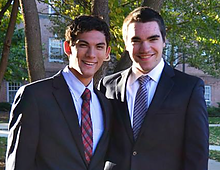Cybersecurity Is All a Game for Two ACES Students

Two students in the Advanced Cybersecurity Experience for Students (ACES) program are looking to revolutionize the way that high school and college students approach the sometimes challenging topic of cybersecurity.
Franz Payer (left) and Kevin Bock (right)—both rising sophomores and computer science majors—have developed an innovative learning platform that incorporates educational content into competition-style games. Their learning tool makes cybersecurity less intimidating for students interested in pursuing it as a major.
Students need only a basic understanding of computer science principles to compete in the online games, says Payer. The platform presents a diverse set of challenges that allows competitors to work on what is most of interest to them, he adds, and features several games with varying degrees of difficulty.
“Metropolis”—designed for beginners—presents a scenario where a nefarious organization has infiltrated and disabled all of the major computer systems in a large city. It is the player's job to regain control of these systems, which can be accomplished by completing different challenges that represent the nuts and bolts of critical IT systems in banks or hospitals. The challenges can range from cracking the new password hackers have installed on a banking system to helping police conduct a cyber investigation using forensics evidence from computer logs. As the challenges are completed, the city is eventually revitalized.
“King of the Hill” is for more advanced users, with players given an entry point into a virtual network comprising more than 100 different systems. These systems have known vulnerabilities, and users are tasked with controlling as much of the network as possible. Competing players can both attack and defend these systems, with both sides using their cyber skills to steal systems away from each other.
Bock and Payer have won recognition for their learning program, earning second place in the UMD Department of Computer Science’s 2014 Fostering Innovation, Success, and Humanity (F.I.S.H.) Bowl, a technology entrepreneurship competition.
Their compelling pitch in the F.I.S.H. Bowl was that most current cybersecurity competitions are not geared toward beginners, with organizers assuming that participants already possess some level of cyber skills.
The students were also recipients of ManTech Cybersecurity Scholarships, which are awarded to undergraduate students based on their academic talent and a demonstrated interest in cybersecurity.
Payer and Bock originally devised their competitive learning platform after teaching several cybersecurity workshops for ACES. They thought it would be a good idea to create a platform to store their learning materials, and started building a secure storage system over their spring break.
“A few days in, we realized we could make something much larger than we had planned,” Payer says. “Both of us had competed in cybersecurity competitions before, and we could identify major flaws [in the competitions] that made them much less effective than they could be.”
As a result of their initial efforts, they decided to license their platform and use it to run their own competitions. They incorporated as Cyber Skyline LLC in April.
The students are planning to hold a competition next March that will revolve around their gaming platform. They hope to get as many as 400 high school and college students to participate.
“Just like how Hackathons are made to encourage students of all skill levels and abilities to attend, we are aiming for the same with our competition,” says Payer, adding that the event will last 12 hours with students working in teams.
Payer, who is working at Tactical Network Solutions this summer, noted corporate sponsors will answer students’ questions, help them set up internships, and more.
Bock, who is working for Northrop Grumman this summer, said he’s grateful to the ACES program for its assistance with their project.
“ACES was very receptive and supportive of our early endeavors in this project,” he says, noting ACES students tested their prototype platform in a “Capture the Flag” competition April 12. “That experience, as well as the student feedback we received after the event, was absolutely instrumental in continuing the development of the company.”
Launched in Fall 2013, ACES is the nation’s first Honors living and learning program for undergraduates interested in cybersecurity. The program is closely tied to the Maryland Cybersecurity Center (MC2), one of 15 centers and labs in the university’s Institute for Advanced Computer Studies.
Michel Cukier, associate director for education in MC2 and director of ACES, says Bock and Payer’s work demonstrates the kind of talent ACES students possess.
“I expect great things from Franz and Kevin,” he says. “Their platform not only presents a lot of challenges, it integrates the spirit of competition with education, which fits the mission of ACES.”
- Story by Melissa Brachfeld
